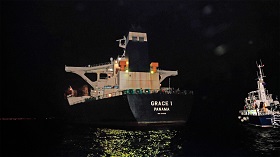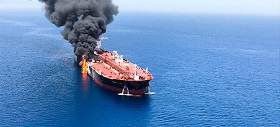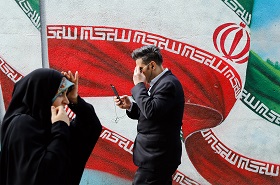In recent weeks, the world’s attention has been riveted on the situation in the Strait of Hormuz. On May 12, four tankers owned by Saudi Arabia and the United Arab Emirates were attacked by unknown forces when entering the Strait off the coast of Fujairah. On June 13, this time in the immediate vicinity of the Iranian coast, two more tankers flying the flags of the Marshall Islands and Panama were attacked. The incidents occurred against the backdrop of another exacerbation in U.S.–Iran relations and the United States imposing more sanctions on Tehran.
Today, there are certain prerequisites for the UN Security Council to draft and adopt an appropriate resolution that could serve as grounds for the formation of a new international naval coalition similar to Combined Task Force 151 (which began patrolling the Indian Ocean in the Gulf of Aden and along the eastern coast of Somalia in 2009).
The initial composition of the new force should be different from the one that patrolled the waters off the coast of Somalia ten years ago. Since Washington is immediate participant in the confrontation in the Persian Gulf today, U.S. naval forces should not form the backbone of the coalition. For the same reason, an international operation, at least at the initial stages, cannot be led by the navies of the any regional powers already involved in a confrontation. It is also difficult, given the situation, to imagine that the navies of Iran and Saudi Arabia could interact effectively.
India, China and Russia could offer their patrolling services, since both India and China are critically dependent on the energy sources transported through the Strait.
The number of participants in the second stage of operation could be expanded to include the navies of the leading European powers, as well as Japan and South Korea, which also receive a large share of their hydrocarbons via the Strait of Hormuz. Subsequently, it would be wise to involve the navies of the United States, Iran, Saudi Arabia and other coastal states of the Gulf in the operation.
However, even before joining the operation, the United States could demonstrate to the entire world that protecting the freedom of navigation is indeed a priority of its foreign policy. For that purpose, as a gesture of goodwill, it would suffice for Washington to make the decision to completely or partially exempt the states that are members of the coalition from the Iranian “oil” sanctions. For India, for instance, such a decision would be a major additional stimulus to join the coalition. Naturally, it would also be an additional incentive for the Iranian leadership to look favorably on the idea of international patrolling operation and to participate in it.
In recent weeks, the world’s attention has been riveted on the situation in the Strait of Hormuz. On May 12, four tankers owned by Saudi Arabia and the United Arab Emirates were attacked by unknown forces when entering the Strait off the coast of Fujairah. On June 13, this time near the Iranian coast, two more tankers flying the flags of the Marshall Islands and Panama were attacked. The incidents occurred against the backdrop of another exacerbation in U.S.–Iran relations and the United States imposing more sanctions on Tehran.
Nobody has claimed responsibility for either of the incidents. As is often the case today, it has not been possible to identify the perpetrators, and military experts are still debating the weapons used in each attack. Without any preliminary casting, the United States accused Iran’s Islamic Revolutionary Guard Corps of being international terrorists. The attacks themselves were interpreted as attempts on the part of Tehran to demonstrate to Washington that Iran was ready for an escalation of the conflict in the region. Naturally, Tehran vehemently denies its involvement, hinting at the possibility of deliberate provocation by one of its many opponents, from Saudi Arabia to Israel.
Following the attacks on the tankers, everyone suddenly remembered that 17–18 million barrels of oil and 3 million barrels of petrochemicals pass through the Strait of Hormuz daily, not to mention liquefied natural gas from Qatar, the world’s second-largest (after Russia) exporter of natural gas. Multiple predictions were made concerning the possible consequences that blocking the Strait of Hormuz would have for the global economy. All kinds of ramifications were envisioned — most experts foresaw a major global shortage of hydrocarbons, unprecedented volatility on the global financial markets, the global economy sliding into a recession and other rather unpleasant events on a global scale.
Essentially, the latest incidents in the Strait of Hormuz confirmed what insightful analysts had been warning about for a long time: the Middle East is not a regional, but a global problem. Any serious exacerbation, not to mention a major war, in the region will inevitably affect the entire global political and economic system, and no one will remain untouched. It is precisely the gravity of the recent events in the Strait that could act as a catalyst for transforming the current negative dynamics both in the Gulf and in the Middle East in general. As the saying goes, every problem has in it the seeds of its own solution.
Let us rewind history 15 years and move southwest of the Strait of Hormuz to the Indian Ocean around the Horn of Africa. It is here, in the Gulf of Aden, that Somalian pirates regularly captured dozens of foreign ships a year in the early 21st century. This criminal business grew steadily and finally became a major obstacle for the freedom of navigation on this popular trade route from Asia to Africa.
When damages ran into millions of dollars, the UN Security Council passed a resolution allowing member states to use their navies and air forces to fight pirates. In early 2009, the so-called Combined Task Force 151 was formed that started patrolling the Indian Ocean in the Gulf of Aden and along Somalia’s east coast. It was thanks to the Combined Task Force and the efforts of the Sheiks of the Al Nahyan family in the United Arab Emirates that the raids of the Somalian pirates were, if not entirely stopped, then seriously reduced.
It is hardly proper to draw direct parallels between the Strait of Hormuz today and the Gulf of Aden a decade ago. Pirates posited a threat stemming from local non-state actors, while in the Strait of Hormuz, we are seeing a clash of interests between the region’s leading powers (Saudi Arabia and Iran), with the participation of a global actor (the United States). Whoever carried out the attacks on the tankers in the strait, it was not savage tribes, but powerful states.
This marks the second major difference between the two situations: there is no international consensus on the Strait of Hormuz that would be similar to the consensus on Somalian pirates ten years ago. Even the problem of promptly and reliably ascertaining the forces that carried out the criminal attacks on civil ships — a problem that did not exist a decade ago — looks hard to solve today.
Nonetheless, the issue of freedom of navigation that hastened the creation of an international coalition in the Gulf of Aden in 2009 appears no less acute in the Strait of Hormuz in 2019. From the point of view of their significance for the global transportation system, the strait and the gulf are quite comparable, which means there are certain prerequisites for the UN Security Council to draft and adopt an appropriate resolution that could serve as grounds for the formation of a new international naval coalition similar to Combined Task Force 151.
The initial composition of the new force should be different from the one that patrolled the waters off the coast of Somalia ten years ago. Since Washington is an immediate participant in the confrontation in the Persian Gulf today, U.S. naval forces should not form the backbone of the coalition. For the same reason, an international operation, at least at the initial stages, cannot be led by the navies of any regional powers already involved in a confrontation. It is also difficult, given the situation, to imagine that the navies of Iran and Saudi Arabia could interact effectively.
India, China, and Russia could offer their patrolling services, since both India and China are critically dependent on the energy sources transported through the Strait, and Russia could carry out such work thanks to the special role that Moscow plays in the Middle East today. Additionally, such a trilateral initiative would send an important signal to everyone that it is possible in principle to conduct major joint operations involving New Delhi and Beijing and, given the multiple problems in China–India relations, such a signal would not count for nothing. Moreover, joint Russia–India–China actions would give an impetus to reviving the RIC trilateral format.
Clearly, details of the patrolling operation need to be discussed and coordinated with coastal states. It is necessary at all costs to avoid giving the impression that the India–China–Russia initiative is aimed against any party in the confrontation in the strait (be it the Arab Gulf monarchies or the Islamic Republic of Iran). Particular sensitivity and attention to detail will be required in consultations with Tehran: Iran is particularly sensitive to any international actions that can be interpreted as another attempt to “surround” or “isolate” the country. Ultimately, however, the Islamic Republic is just as interested in preserving freedom of navigation in the Strait of Hormuz as any of its Arab neighbors, and it is preferable for Tehran to have this freedom guaranteed by its partners, rather than by its opponents.
The number of participants in the second stage of operation could be expanded to include the navies of the leading European powers, as well as Japan and South Korea, which also receive a large share of their hydrocarbons via the Strait of Hormuz. Subsequently, it would be wise to involve the navies of the United States, Iran, Saudi Arabia and other coastal states of the Gulf in the operation.
However, even before joining the operation, the United States could demonstrate to the entire world that protecting the freedom of navigation is indeed a priority of its foreign policy, and that this priority is more important and of greater principled value that the desire to “punish Iran” for a policy in the Middle East that does not accord with U.S. interests.
For that purpose, as a gesture of goodwill, it would suffice for Washington to make the decision to completely or partially exempt the states that are members of the coalition from the Iranian “oil” sanctions. For India, for instance, such a decision would be a major additional stimulus to join the coalition. Naturally, it would also be an additional incentive for the Iranian leadership to look favorably on the idea of international patrolling operation and to participate in it.
The immediate tactical task of the international operation is to ensure freedom of navigation in the Persian Gulf and prevent a possible escalation of a conflict that would have unpredictable regional and global consequences. A forward-looking strategic task is to use naval interaction in the Gulf to create an initial prototype of a new regional security model. The gradual expansion and deepening of multilateral international naval interaction in the Persian Gulf should allow the countries involved in the confrontation to open a dialogue on naval doctrines, hold regional meetings between ministers of defense and set up hotlines between military agencies.
At some stage, Iran and its current opponents in the Gulf could agree to exchange preliminary notifications on plans to conduct naval exercises and hold air force training flights, as well as on exchanging observers at exercises and providing each other with data about purchases of naval ships, submarines, etc. A first, but crucial step would thus have been made towards a future regional collective security system.
The idea of international patrolling of the Strait of Hormuz with the participation of China, India, and Russia is naturally vulnerable to criticism, particularly in today’s charged environment. There will be people in Washington claiming that this plan essentially means encouraging Iran’s irresponsible behavior in the strait. There is likely to be talk in Tehran about “betrayal” by its historical partners and friends.
Coordinating the activities of China and India’s navies will not be easy, and ensuring balanced representation of coastal states in the naval operation will be more difficult still. Involving Donald Trump in an international operation where U.S. admirals will not play the main role is by no means a trivial task. However, the scale and acuteness of the problem in the Strait of Hormuz are such that they leave no room for trivial approaches.
First published in French in Le Courrier de Russie.







